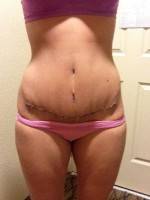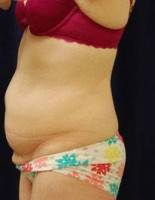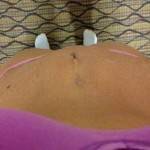Losing weight after tummy tuck and lipo
Weight loss and timing of surgical procedures
You will have a much better result if you are at or near your ideal or desired body weight before proceeding with surgery. Though there is not an exact number, even being within 5 – 10 pounds should be reasonable.
As it appears that you are gradually decreasing your weight rather than fluctuating wildly, I don’t feel that it is necessary to wait 3 – 6 months after you are at your ideal/chosen weight before having your surgery but this is not a misguided approach either. If you have not been on a starvation diet which would impair the healing process, then a shorter period of time would be acceptable – such as a month.
Combining procedures can be a cost and time effective way to address multiple areas as long as the total operative time is not unreasonably long. (Steven Turkeltaub, MD, Scottsdale Plastic Surgeon)
Reaching a stable weight is important prior to tummy tuck
Reaching and maintaining a reasonable, healthy and achievable weight is important before a tummy tuck. It would be pointless to reach a “goal” weight if shortly thereafter a significant increase in weight is seen that affects the outcome. The longevity of the result after a tummy tuck procedure is directly affected by:
- Stable weight
- Complete correction of skin laxity
- Pregnancy
Young women contemplating future pregnancy should consider less extensive procedures since the future may affect the longevity of the outcomes. (Mario Diana, MD, Plano Plastic Surgeon)
Weight Stable for Tummy Tuck
I typically make sure that my patients’ weight is reasonably stable for 3-6 months before proceeding with a tummy tuck or body contouring surgery. While patients may not always be at their best possible goal weight, it’s important that their bodies aren’t undergoing major changes that could affect their end result.
It also helps to make sure that the eating habit and lifestyle changes that they made are sustainable, so they get the best possible result shortly after surgery as well as longterm. (John K. Wakelin III, MD, Columbus Plastic Surgeon)
Surgery after weight loss
I usually like to see a stable weight for at least 3-6 months, and this is for the patient’s sake – to be more confident that the results will be long-lasting. Any significant fluctuations (up or down) after surgery will compromise your results and it is to your benefit to wait until you are confident that your lifestyle and eating/exercise habits are stable.
Making sure that your diet is healthy and full of natural vitamins (lots of fruits, vegetables, beans, etc.) is also important – weight loss on a crash diet or harmful drugs is a recipe for surgical or healing problems. You state that you have the same saggy skin, but if you go on to lose > 20 more pounds, you may have even more skin and less fat, so your results will be even better (ie, tighter) if you wait! Regarding combining surgeries, it is best to talk with your plastic surgeon to determine what is safest. (Michelle Spring, MD, Missoula Plastic Surgeon)
Tummy tuck, weight loss
Every patient I have ever seen for a tummy tuck after major weight loss still has a “little to go to meet my goal”. I think you should trust your surgeon to tell you if there is any significant loss still necessary (or possible) in the abdomen. I do like my patients to be stable at their weight for 12 months before undergoing any body contouring surgery. (Ronald V. DeMars, MD, Portland Plastic Surgeon)
Timing and tummy tucks and weight loss
In general it is best to be at or near your goal weight and have a stable weight prior to a tummy tuck. Waiting will assuring there there will be no further fluctuations in weight will assure a longer lasting result and less need for revisions.
- Losing weight after tummy tuck and lipo photos
- Losing weight after tummy tuck and lipo pictures
- Losing weight after tummy tuck and lipo scar
- Losing weight after tummy tuck and lipo surgery images
Combination procedures are often done however combining too many procedure increases the operative time, costs, and often the rate of complications. Discuss which procedures you want with your PS and let him/her help you decide timing and sequencing that is best. (Delio Ortegon, MD, San Antonio Plastic Surgeon)












